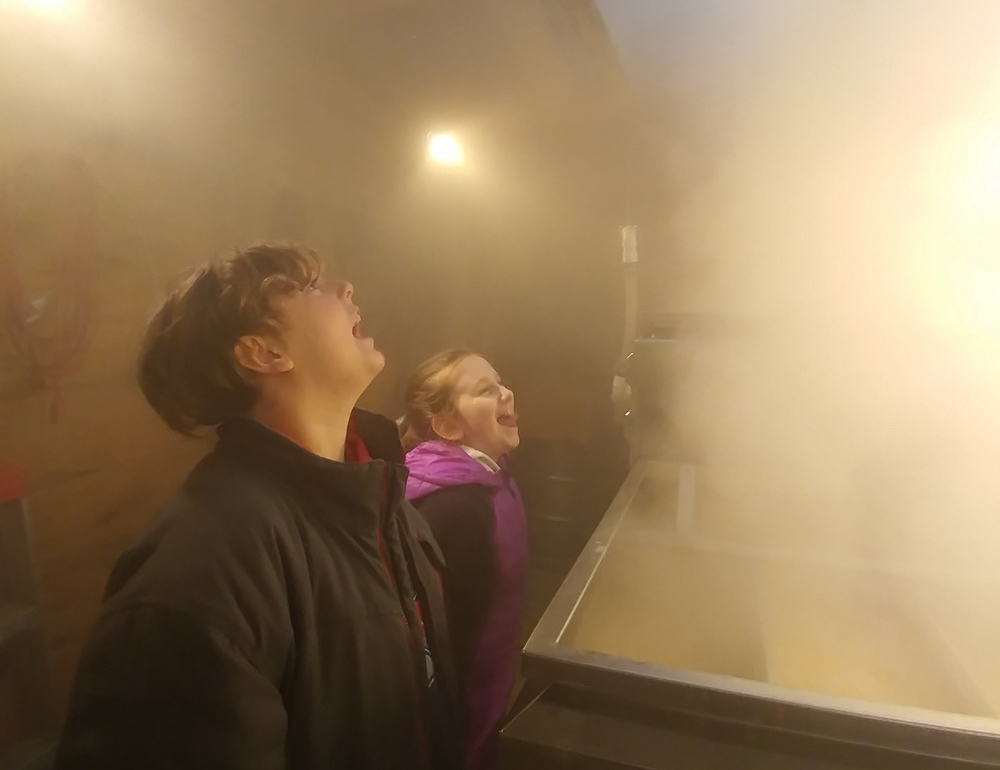Programs
Schoolyard Sugaring
In the Sugar House

After sap is collected in the sugarbush it is taken to a sugar house where it is refined from raw sap (2% sugar and nutrients and 98% water) to maple syrup (66.7% sugar and nutrients and 33.3% water). With ever-evolving innovation, the process of making maple syrup has become more efficient while requiring less labor and fuel.
Educators and students interested in participating in this historic and cherished experience will find the resources and guides below helpful no matter the budget, skill, or resources. Additionally, these tools can help highlight many of the concepts and processes needed to produce maple syrup found in classroom concepts as authentic learning connections.
Sugar House Vocabulary
Maple syrup production has its own unique equipment, processes, and vernacular or language. The vocabulary resource will help you familiarize yourself with many of the terms used within a sugar house.
Technical Resources
How to Make Maple Syrup
Get an overview of all the processes, science, and legal requirements of making and selling maple syrup.
Maple Syrup Processing: Sap to Bottle
Learn the complete process of turning maple sap to syrup.
Using a Maple Hydrometer
How to use a maple hydrometer to measure the solids density in a maple sap solution. Your goal is to achieve a density of 66.7%. (Hydrometer and syrup cup used in this video are included in the Maple Starter Kit.)
Using a Refractometer
How to use a refractometer to measure the solids density in a maple sap solution.
Reverse Osmosis
Learn about the process of reverse osmosis and how this process can help save sugarmakers time, energy consumption, and money when making maple syrup.
RO Bucket
The RO Bucket is a small-scale, affordable hobbyist reverse osmosis system which is designed, produced, and for sale from and by a New York educator. These systems can save time and fuel costs.
Boiling Maple Sap using Propane Burners
A propane burner is often the equipment used for those beginning to make maple syrup.
Boiling Maple Syrup on a Cinderblock Arch
Tips and tricks on building a cinderblock arch and evaporating sap in a large syrup pan.
Backyard Engineering of a Homemade Evaporator
The processing of maple syrup can be a major hurdle for hobbyists and beginning maple producers. Often, new sugarmakers use “backyard ingenuity” and creativity to find solutions to overcome this hurdle. Long-late night boils can often find one thinking up and creating new upgrades from season to season. The following is one example of a sugarmaker documenting his journey through this creative process.
- File cabinet evaporator 1.0
- File cabinet evaporator 2.0
- File cabinet evaporator 3.0
- File cabinet evaporator 4.0
Boiling on a Small Evaporator
Tips on how to get started with a small-scale maple operation.
Boiling on a Large Evaporator
Learn about the many processes that take place when turning sap to syrup in a large evaporator.
Maple Syrup Gravity Filtration
How to gravity filter maple syrup after it has been processed. (Cone filters used in this video can be reused, and are included in the 2024 Maple Starter Kit.)
Grading Maple Syrup
Learn about the different grades of maple syrup.
Grading Maple Syrup with a Grading Kit
How to grade maple syrup using a grading kit.
Bottling Maple Syrup in Plastic Containers
How to bottle maple syrup in a plastic container.
Bottling Maple Syrup in Glass Containers
How to bottle maple syrup in a glass container.
Value Added Maple Products
With pure maple syrup prices being stable, many sugarmakers use value-added products to increase the value of their maple syrup while diversifying their offerings.
Maple Syrup Marketing
From the start to minute 24, learn how veteran maple syrup producers' market, sell, and build a community around their maple syrup farms businesses. Minute 24 until the end, hear from marketing and brand development specialists on how to build a market and brand identity for your product.
Additional Resources
Cornell Maple Program
Find resources covering many concepts, processes, research, and best practices found within the maple sector.
Cornell Maple Program Website
Find resources covering many concepts, processes, research, and best practices found within the maple sector.
University of Vermont Proctor Maple Research Center
Resources covering many concepts. Processes, research, and best practices found within the maple sector.
Texts for Maple Production
Cornell Maple Production for Beginner's Notebook
Maple researchers from Cornell University put together this step-by-step guide which contains concepts, processes, research, and best practices for those who are new to the production of maple syrup and those who want to grow their existing maple syrup operations.
The Sugarmaker's Companion
Maple farmer and researcher Mike Farrell's production guide for developing a maple operation from sugarbush to value added products.
North American Maple Syrup Producers Manual
University of Vermont in Cooperation with The North American Maple Syrup Council created an extensive science-based guide for the production of maple syrup from hobbyists and beginner producers to large scale maple syrup operations.
